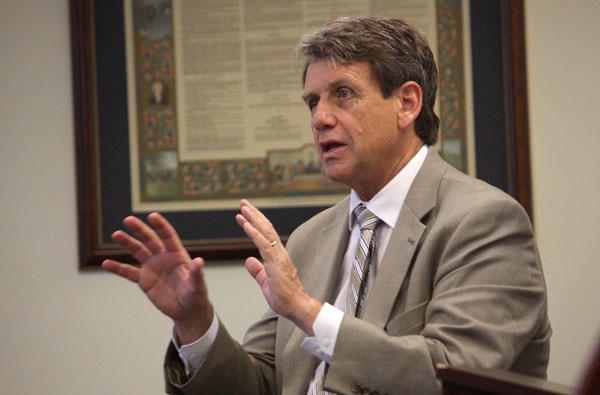Virginia a focus of calls for Constitutional Convention
In statehouses across the country, a movement has been building for legislatures to call for a convention to amend the U.S. Constitution and limit the federal government’s power. Although the national project is based in Virginia, the General Assembly rebuffed resolutions to have Virginia join the campaign.

By Sean CW Korsgaard
In statehouses across the country, a movement has been building for legislatures to call for a convention to amend the U.S. Constitution and limit the federal government’s power.
The group pushing for a Convention of the States is based in Virginia and enjoys support from Tea Party luminaries like Ken Cuccinelli, Virginia’s former attorney general. At the start of the General Assembly’s 2015 legislative session, two resolutions were filed to have Virginia join in calling for a full-fledged constitutional convention.
You might have expected the idea to win favor at the Virginia Capitol, where Republicans control both the House and Senate. But despite early support, both resolutions fizzled.
Supporters’ final hope was House Joint Resolution 497, sponsored by Del. L. Scott Lingamfelter of Woodbridge and more than 20 other Republican legislators. It had been endorsed by the House Rules Committee on an 11-4 vote and sent to the full House for consideration. But after the floor vote was delayed for four days, Lingamfelter withdrew his proposal on February 5th.
“George Washington, who was chief among all the founders, the most important founder, observed in war that you have to see things as they are, not as you would wish them to be,” Lingamfelter said. “It is with a heavy heart, but one resolved to come back and fight again, that I move we strike HJR 497 on Page 19 of the printed calendar.”
Lingamfelter’s decision came a day after Sen. Ryan McDougle, R-Hanover, pulled his similar version of the resolution, SJR 269. McDougle’s measure had cleared the Senate Rules Committee, 9-2, and was facing delays on the Senate floor.
Both resolutions complained about the rising national debt, unfunded mandates and “excessive uses of power” by the federal government. A Convention of the States would propose constitutional amendments to “impose fiscal restraints on the federal government, limit the power and jurisdiction of the federal government, and limit the terms of office for its officials and for members of Congress,” the resolutions stated.
Despite the setback, Virginia remains at the center of the fight being waged nationally by the Convention of States Project. The project is based in the Loudoun County town of Purcellville. Michael Farris, a constitutional lawyer and former GOP nominee for Virginia lieutenant governor, is heading the project for the group Citizens for Self-Governance.
“George Mason said that someday we are going to reach a point where the government we are creating will abuse its authority, and when that day happens, we are going to need a process for structural changes to reign in on the abuse of powers,” Farris said at a rally in Richmond in January. “This is that process.”
The Convention of States Project has been endorsed by conservative icons like Mark Levin, Sarah Palin and Glenn Beck. Ironically, for a campaign that enjoys such bona fides among political conservatives, it was a conservative who sealed the movement’s fate in the General Assembly this year.
Sen. Dick Black, R-Loudoun, sent an e-mail circulating rumors that billionaire philanthropist George Soros and dozens of liberal groups, such as Occupy Wall Street, were the ones “pushing for” the Convention of States Project. That was enough to put the brakes on the resolutions, at least for this year.
The goal of the Convention of States Project is to hold an “Article V Convention.” (Article V of the U.S. Constitution allows states to call a convention to propose constitutional amendments.) Such a convention must be held if two-thirds of the states call for one. Amendments approved by an Article V Convention must be adopted by three-fourths of the state legislatures to become law.
In March 2014, Georgia became the first state to call for a Convention of the States. The next month, Alaska and Florida followed suit.
This year, resolutions calling for a Convention of the States have been introduced in 24 state legislatures, including in Virginia. The Arizona House and the North Dakota House have approved the resolutions; the senates in those states still must weigh in.
At least 34 states must pass such resolutions in order to petition Congress to set a date and venue for an Article V Convention.
— ∮∮∮ —
Other Attempts to Amend U.S. Constitution
Two Virginia legislators sought to amend the U.S. Constitution on specific issues, and their efforts also died this session.
Sen. Emmett Hanger, R-Mount Solon, sponsored a resolution (SJ 252) calling for an Article V convention to propose a constitutional amendment requiring the federal government to operate on a balanced budget.
“This nation has become deeply in debt as its expenditures have exceeded available revenues so that the total federal public debt now exceeds $17 trillion and continues to increase,” the resolution says.
SJ 252 was approved 9-2 by the Senate Rules Committee and advanced to the full Senate for consideration. After a four-day delay, the resolution was sent back to the Rules Committee, where it died.
Del. Sam Rasoul of Roanoke was the only Democrat to sponsor a resolution calling for an amendment to the U.S. Constitution. HJ 545 called for an amendment to “limit the amount of money corporations and labor unions can spend to influence the electoral process.”
Rasoul’s resolution said a 2010 decision by the U.S. Supreme Court, in the case Citizens United v. Federal Election Commission, “has resulted in unprecedented amounts of unregulated campaign expenditures by corporations, drowning out the voices of ordinary citizens.”
HJ 545 was tabled on a voice vote by the House Rules Committee.
-
Recommend this
on Facebook -

Report an error
-

Subscribe to our
Weekly Digest




There is 1 reader comment. Read it.